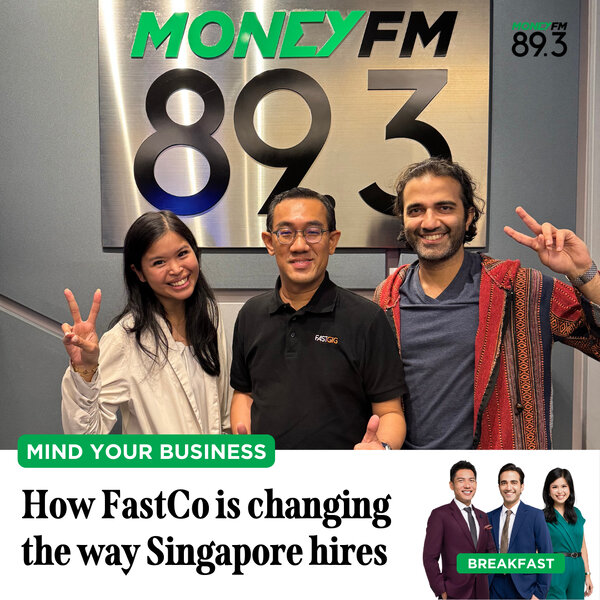FastGig x Mind Your Money - Are gig workers the new answer to manpower shortage?
Interview with Julian Tan, CEO of FastCo Asia – CNA "Mind Your Money", 22 July 2025
In a recent interview on CNA’s Mind Your Money, FastCo Asia CEO Julian Tan spoke with host Cheryl Goh about how Singapore’s gig economy has evolved—and how FastGig is playing a pivotal role in shaping the future of flexible hiring for both businesses and individuals.
Once dominated by ride-hailing and food delivery, the gig economy has now expanded into key sectors like F&B, retail, logistics, and events. As Julian shared, this shift reflects a growing demand for agility in the workforce—and FastGig is meeting that need by connecting companies to a network of over 85,000 active gig workers across Singapore.
Click here for the full interview and get more insights.
Making Gig Work More Accessible Than Ever
Julian emphasized that becoming a gig worker is far more accessible than most people think. As long as you're a Singaporean or PR aged 16 and above with a smartphone, you're already halfway there. With the FastGig app, anyone can set up a profile, list their skills or certifications, and start applying for jobs that match their experience and availability.
Beyond technical requirements, Julian highlighted that soft skills matter just as much—if not more. “Traits like reliability, adaptability, and a positive attitude go a long way. Employers value workers who show up, do the job well, and can adjust quickly to different roles,” he explained.
Why Businesses Are Turning to Gig Talent
In today’s economic climate, many businesses are grappling with uncertainty, fluctuating demand, and leaner operations. FastGig offers a timely solution—giving employers speed and flexibility in how they staff up.
“With over 85,000 workers on our platform, businesses can scale up their workforce almost instantly,” Julian said. “For example, if a retailer or F&B outlet expects a weekend spike or needs extra hands during festive periods, they can simply post the job in the app. The system matches them with available giggers who meet the requirements.”
This model helps companies avoid the risks of overstaffing or understaffing, and ensures businesses stay agile, efficient, and cost-effective, especially when managing seasonal surges or short-term manpower gaps.
Technology That Simplifies Everything
Cheryl pointed out a standout feature of FastGig: Payroll (Consolidated Payments). Rather than having companies handle wage payments to workers individually, FastGig acts as the middle layer—streamlining everything from time tracking to disbursements of wages.
Julian explained how the app automates the entire process. “Employers can log in, view who worked, how many hours, and what they’re owed. Gig workers check in and out for the shift using the app. The gig workers can track their hours, and see how much they’ve earned in real time. We then ensure payments are processed accurately and paid out weekly, giving workers and employers both transparency and peace of mind.”
This back-end support removes friction and allows both sides to focus on what matters most—getting the job done.
Empowering Workers Who Need Flexibility
One of FastGig’s core missions is to open up meaningful earning opportunities for those who may not fit into a typical 9-to-5 job. Julian shared how the platform has become especially helpful for stay-at-home parents, students, and retirees—people who want flexibility while still contributing to the household income or remaining engaged.
“For many, this is more than just a side gig—it’s a way to find purpose, stay active, and maintain financial independence,” he added.
Final Thought: Gig Work as a Viable Career Path
In closing, Julian offered a perspective shift: “Gig work is no longer just a stopgap. It’s becoming a long-term career choice for many. With the right attitude, skills, and tools like FastGig, anyone can find flexible, meaningful work that fits their lifestyle—on their own terms.”




